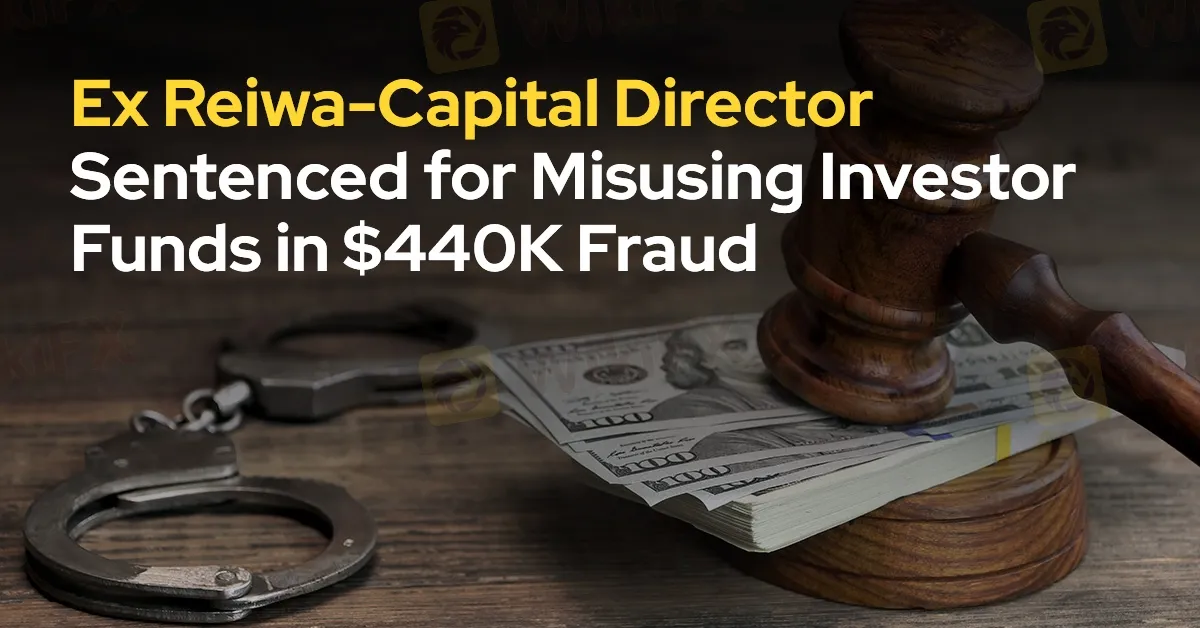简体中文
繁體中文
English
Pусский
日本語
ภาษาไทย
Tiếng Việt
Bahasa Indonesia
Español
हिन्दी
Filippiiniläinen
Français
Deutsch
Português
Türkçe
한국어
العربية
Ex Reiwa-Capital Director Sentenced for Misusing Investor Funds in $440K Fraud
Abstract:Russell Sandiford, the former director of Reiwa-Capital, has been sentenced to two years and eight months' imprisonment for dishonest use of investor funds, as determined by the District Court of New South Wales.

Russell Sandiford, the former director of Reiwa-Capital, has been sentenced to two years and eight months' imprisonment for dishonest use of investor funds, as determined by the District Court of New South Wales. The sentence, issued on September 6, 2024, will be served through an Intensive Correction Order (ICO) following Sandiford's guilty plea to two counts of dishonest conduct in connection with a financial product, violating Section 1041G of the Corporations Act.
The charges stem from events that occurred between January 2020 and June 2022, during which Sandiford contacted individuals using email addresses obtained during his previous employment as a market trader and analyst at brokerage firms. He offered these individuals two investment opportunities: a “Hedge Fund” that promised a split of profits from his foreign exchange and commodities trading, and an “Income Fund” where investors would contribute capital to a pool for similar trading activities.
A total of 74 clients were drawn into Sandifords schemes, collectively investing $440,909. However, rather than using the funds for trading as promised, Sandiford diverted the majority of the money for personal use, including gambling and personal entertainment. Of the total amount, only $6,316 was returned to investors, with the remaining funds lost. No other repayments were made to the victims.

In delivering the sentence, the Court described Sandiford's actions as a “serious breach of trust” that he had deliberately cultivated with his clients. Judge O‘Brien highlighted that Sandiford's motivation was greed, exacerbated by his struggles with alcohol, cocaine, and gambling at the time of the offenses. Despite these circumstances, the Court acknowledged Sandiford’s efforts to rehabilitate after being charged, which influenced the decision to allow him to serve his sentence through an ICO, subject to a home detention order.
The sentence was stayed until September 27, 2024, pending an assessment of Sandifords suitability for home detention. In addition to the prison term, reparation orders were made in favour of the victims to compensate them for their losses.
The case was prosecuted by the Office of the Director of Public Prosecutions (Cth) following a referral from the Australian Securities and Investments Commission (ASIC), underscoring the seriousness of financial misconduct and the legal consequences of such actions in Australias financial markets.

Disclaimer:
The views in this article only represent the author's personal views, and do not constitute investment advice on this platform. This platform does not guarantee the accuracy, completeness and timeliness of the information in the article, and will not be liable for any loss caused by the use of or reliance on the information in the article.
Read more

The Ultimate Guide to Automated Forex Trading in 2025
Modern markets are revolutionized by automated trading systems, which now execute 70-85% of all transactions. These advanced automated trading software solutions, commonly called trading robots or Expert Advisors (EAs), leverage algorithmic precision for automatic trading across forex, stocks, and commodities 24/7. By removing emotional interference and executing trades in microseconds, auto forex trading platforms create fair opportunities for all market participants. For those new to automated trading for beginners, these systems provide disciplined, backtested strategies while significantly reducing manual effort.

Anti-Scam Groups Urge Tougher Action on Fraudsters in UK
Anti-scam groups demand tougher police action on fraudsters as UK fraud rates surge 19%, targeting millions in a penalty-free crime spree exposed by a $35m scam leak.

Philippines Deports 29 Indonesians Linked to Online Scam Syndicate in Manila
Online scam groups in the Philippines trick Filipinos into gambling and love scams, from Manila to Bacolod, causing trafficking and pain as police fight back.

Why does your mood hinder you from getting the maximum return from an investment?
Investment decisions are rarely made in a vacuum. Aside from the objective data and market trends, our emotions—and our overall mood—play a crucial role in shaping our financial outcomes. Whether you’re feeling overconfident after a win or anxious after a loss, these emotional states can skew your decision-making process, ultimately affecting your investment returns.
WikiFX Broker
Latest News
How Crypto Trading Transforms FX and CFD Brokerage Industry
FCA Warns Against 10 Unlicensed or Clone Firms
CySEC Warns Against 14 Unlicensed Investment Websites
Top Currency Pairs to Watch for Profit This Week - March 31, 2025
Will natural disasters have an impact on the forex market?
Philippines Deports 29 Indonesians Linked to Online Scam Syndicate in Manila
Exposed: Deceptive World of Fake Trading Gurus – Don’t Get Fooled!
AI-Powered Strategies to Improve Profits in Forex Trading
Stock Market Trading Volume Drops by 97.58 Billion Naira This Month
Why does your mood hinder you from getting the maximum return from an investment?
Currency Calculator







